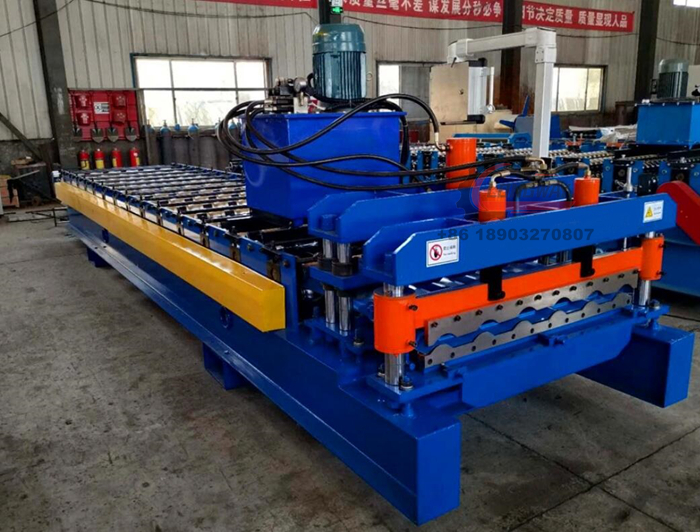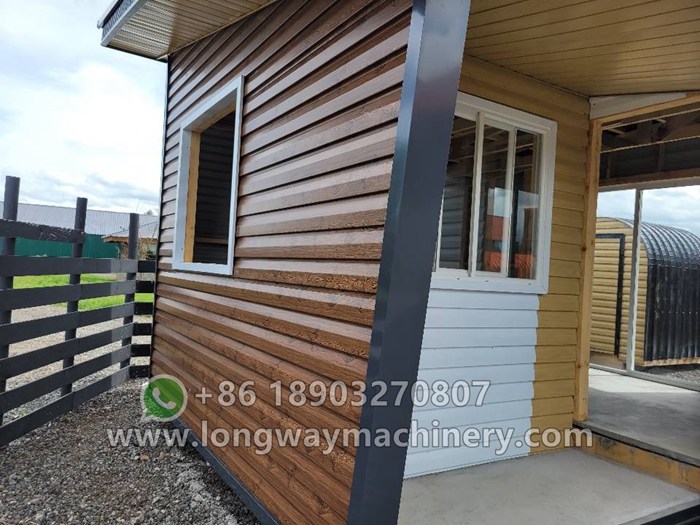Gutter Rolling Machine for Sale High Precision & Affordable
- Market demand and performance data for modern gutter rolling machines
- Technical specifications differentiating premium gutter rolling systems
- Comparative analysis of leading manufacturers and factories
- Customization capabilities for specific production requirements
- Operational case studies across construction sectors
- Critical purchase considerations and maintenance protocols
- Strategic buying guide for procurement decision-makers

(gutter rolling machine for sale)
Market Demand for Advanced Gutter Rolling Equipment
Global construction activities continue driving robust demand for rain gutter systems, with the metal roofing market projected to exceed $18 billion by 2026. This growth directly impacts requirements for efficient gutter rolling machines capable of handling diverse materials including galvanized steel, aluminum, and copper alloys. High-volume contractors increasingly seek equipment processing 40-60 linear feet per minute, prioritizing systems minimizing material waste through precision calibration.
Contemporary gutter machines demonstrate significant technological evolution beyond traditional manual alternatives. Leading units now incorporate laser-guided alignment systems maintaining ±0.01" dimensional accuracy during continuous 8-hour production cycles. Advanced servo motors reduce energy consumption by 30% compared to hydraulic predecessors while achieving torque outputs exceeding 120Nm. These enhancements deliver measurable ROI through 4-7 month payback periods for mid-scale operations producing 15,000 linear feet monthly.
Engineering Specifications of Premium Rolling Systems
Modern gutter forming technology incorporates several critical design improvements. Dual-stage feeding mechanisms with computer-controlled rollers eliminate material slippage even when processing painted aluminum substrates. Below highlights core technical specifications distinguishing commercial-grade equipment:
- Material thickness capacity: 24-29 gauge steel, .019"-.032" aluminum
- Forming station construction: Chromium-plated steel rollers (HRC 58-62 hardness rating)
- Drive systems: 10HP AC vector motors with digital torque control
- Control interfaces: 7" HMI touchscreens with profile memory storage
- Safety compliance: ISO 12100 Category 3 safety interlocks
Systems achieving UL/CE certification implement thermal monitoring sensors that auto-disable rollers when bearing temperatures exceed 90°C. Additionally, quick-change tooling assemblies enable profile transitions in under 7 minutes - particularly valuable for factories producing multiple gutter styles. These engineering refinements collectively reduce operational downtime by approximately 35% across typical production schedules.
Manufacturer Capabilities Comparison
Discerning buyers should evaluate suppliers across multiple operational criteria. The following comparison details key differentiation points among prominent equipment producers:
| Manufacturer | Production Volume | Standard Warranty | Lead Time | Service Network |
|---|---|---|---|---|
| PrecisionForm Systems | 220 units/month | 3 years parts/2 years labor | 6-8 weeks | 18 North American locations |
| EuroRoll Technologies | 150 units/month | 2 years comprehensive | 10-12 weeks | Global 24/7 support |
| MetalMaster Industries | 95 units/month | 1 year full coverage | 14-16 weeks | Regional partners only |
| ProGutter Machinery | 180 units/month | 5 years drive system | 8-10 weeks | Factory direct technicians |
Independent durability testing reveals significant performance variations between manufacturers. Premium brands typically withstand 200,000+ operating cycles before requiring major component replacement, whereas budget equipment averages 80,000 cycles. Additionally, established factories maintain CNC machining tolerances within 5 microns versus 15-20 micron variations in secondary suppliers.
Custom Configuration Options
Leading gutter rolling machine manufacturers offer extensive customization addressing specific operational environments. Facilities processing copper materials frequently require corrosion-resistant components including stainless steel rollers and coated guide assemblies. Operations targeting architectural applications commonly select programmable depth control enabling formation of specialized profiles like Ogee or Victorian shapes beyond standard K-style patterns.
Industrial-scale buyers can integrate inline punching modules creating downspout connection points during forming sequences. This configuration eliminates secondary operations while increasing throughput by 15 meters/hour. Customizations typically add 25-30% to baseline pricing but become cost-effective at annual production volumes exceeding 120,000 linear feet. Manufacturers maintaining dedicated engineering departments typically deliver prototype-reviewed solutions within 45 days.
Documented Operational Applications
Industrial contractors consistently report productivity improvements after implementing advanced gutter rolling machines. Midwest Roofing Systems achieved a 40% output increase using dual-head equipment producing both fascia and half-round profiles in continuous cycles. The operational data demonstrates measurable impact:
- Daily production increase: 3,200 LF → 4,500 LF (10-hour shift)
- Material waste reduction: 9% → 3.2% via optical measurement systems
- Labor requirement change: 3 operators → 2 technicians
Specialized factories serving historic district renovation projects utilize combination machines forming and soldering copper gutters in integrated processes. Such configurations reduce material handling while maintaining authentic appearance profiles mandated by preservation guidelines. Florida-based Coastal Metalworks documented elimination of 450 annual labor hours after upgrading to automated coil loading systems on primary gutter equipment.
Procurement Considerations for Buyers
Prospective buyers should conduct thorough evaluation across technical, support, and operational factors. Verify manufacturer validation of critical load-bearing components like drive shafts and gearboxes through documented ISO 6336 testing protocols. Request performance certification data demonstrating achievable dimensional tolerances across sustained production runs rather than optimal laboratory conditions.
Evaluate service responsiveness through reference checks documenting mean-time-to-repair statistics. Operators consistently report 10-15% higher productivity when selecting locally supported equipment versus imports with delayed technical assistance. Establish preventative maintenance requirements beforehand: premium systems need quarterly lubrication calibration while industrial-grade equipment requires weekly roller alignment verification.
Strategically Acquiring Gutter Rolling Technology
The gutter rolling machine market provides diverse options requiring careful assessment against operational objectives. Established manufacturers offer superior longevity evidenced by comprehensive testing documentation and extended warranty terms. When exploring gutter rolling machines for sale, prioritize vendors providing application engineering consultations confirming equipment compatibility with targeted production volumes and material specifications.
Responsive manufacturers often facilitate onsite demonstrations using client materials before finalizing purchases. Larger gutter rolling machine factories typically maintain immediate-shipment inventory of standard models while accommodating specialized configuration timelines. Industry-leading suppliers deliver turnkey solutions including installation supervision, operator training programs, and remote diagnostic support - critical elements ensuring seamless integration into production environments.

(gutter rolling machine for sale)
FAQS on gutter rolling machine for sale
以下是根据要求创建的5组英文FAQ问答,采用HTML格式:Q: Where can I buy a gutter rolling machine?
A: Gutter rolling machines are available directly from manufacturers or authorized distributors globally. You can find new and used models through industrial equipment marketplaces like Alibaba or Thomasnet. Always verify seller credentials before purchasing.
Q: How to choose reliable gutter rolling machine manufacturers?
A: Prioritize manufacturers with ISO certification and 5+ years of industry experience. Check customer reviews on platforms like Trustpilot and request equipment demonstrations. Reputable brands typically offer 12-24 month warranties on machinery.
Q: What factors affect gutter rolling machine pricing?
A: Prices range from $2,000-$15,000 depending on automation level and production capacity. Key cost factors include material thickness handling (e.g., 24-30 gauge steel), rolling speed (15-30 ft/min), and additional features like CNC controls. Custom configurations increase base pricing by 15-30%.
Q: What specifications should I check when selecting a gutter machine?
A: Verify material compatibility (copper, aluminum, galvanized steel), roll forming stations (typically 7-15 stations), and profile outputs (K-style, half-round). Confirm motor power (3-7.5 HP), operation voltage (110V/220V), and throughput capacity (200-500 linear feet/hour).
Q: Can gutter machine factories provide customized solutions?
A: Most factories offer customization for unique profiles or production requirements. Provide your gutter dimensions, daily output goals, and material preferences for tailored solutions. Leading manufacturers can deliver prototype units within 4-6 weeks.
-
Corrugated iron roofing sheet making machine with CE, AutoNewsNov.17, 2025
-
3mm Steel C U Channel Roll Forming Machine, Heavy DutyNewsNov.17, 2025
-
Calamima Micro Ondulada corrugated roof sheet machine - CNCNewsNov.17, 2025
-
Metal Roofing Roll Former for Sale Companies - Fast, PreciseNewsNov.17, 2025
-
Drywall Steel L Angle Bar forming machine | Fast, PreciseNewsNov.17, 2025
-
Corrugated Iron Roofing Sheet Making Machine, Fast & DurableNewsNov.11, 2025
-
Corrugated Metal Roofing Machine | High-Speed, Precise, CENewsNov.11, 2025







